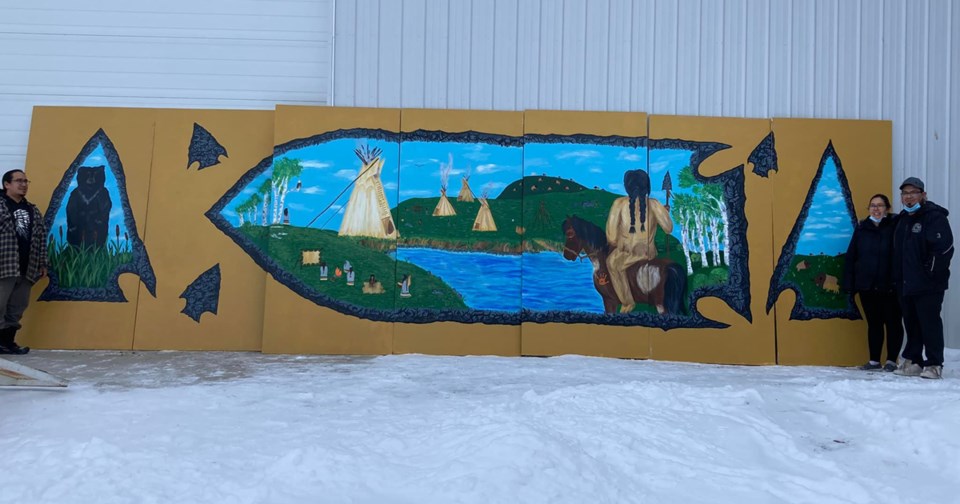MELFORT — A new mural that was commissioned by the Melfort and District Museum depicting local Indigenous culture and family is slated for a grand opening in June for Indigenous Peoples Day.
The mural, painted with acrylics on eight 4x8 boards, was made in 164 hours by a team consisting of Edward Stonestand, the museum’s cultural adviser and project lead, his sister Felicity Sanderson, and his brother-in-law Jonas Sanderson.
Gailmarie Anderson, the museum’s curator, said the request was for a mural that reflects the collection inside the Indigenous Peoples and Archeology building, where it will be installed on the exterior of this spring.
“We’re extremely happy with it,” Anderson said. “The contract was for a few months, he delivered it on time. We thought it was very well done.”
The boards show an image of a warrior on a horse, looking away from the observer, overlooking green hills which are separated by a river running through. On either side, family members go on about their daily business such as scrapping and hanging hides, or playing with the children. The scene is painted around the shape of an arrowhead, with boards on either side depicting arrowheads with other scenes – a bear and a field of bison.
Anderson said the mural is planned to be noticeable by people when they enter the museum grounds through the main gate.
“We started the museum as an agricultural museum in the 1970s so we feature the whole settler era, the fur trader era a little bit but mostly the settler era. We wanted to go beyond that to the natural inhabitants of this area. That is one way we were able to express our desire to do that.”
Stonestand said that he’s typically familiar with painting on one or two feet canvases, with the biggest previous record being two by four feet. For the mural, they started with three different designs drawn out, and chose what fit the best.
“There were little pieces on the painting that represent something, especially with Indigenous culture,” he said. “For instance there is a red hand on the horse which symbolizes the missing and murdered Indigenous women.”
Other symbolism includes the inclusion of the white bison, representing a new beginning, and the Indigenous family in the background. The bear serves to represent both the animal and the artist.
“It brings family together,” Stonestand said. “There’s family members in that painting doing certain things, in reality that’s what I brought with my sister and brother-in-law doing that together.”
Stonestand said that all three of them had different boards, but would influence one another’s works.
“All three of us, we’re all different styles of painting, and we kind of just put it together – all three styles.”
If he were to give it a name, Stonestand said it would likely be “Unity.”
“It’s unity of everything in our culture. How everybody comes to one and works on something to make it work together – like unity. I’d imagine that’s what I’d call it.”
The grand opening will be held on National Indigenous Peoples Day in the afternoon on June 21 which will be open to the public. Anderson said she expects a “packed program” with demonstrations, dignitaries invited and recognition of the major donors of the collections.
“I’m very happy and I’m excited for it to go up on the building, for everyone to see,” Stonestand said. “I’m excited for that day.”




